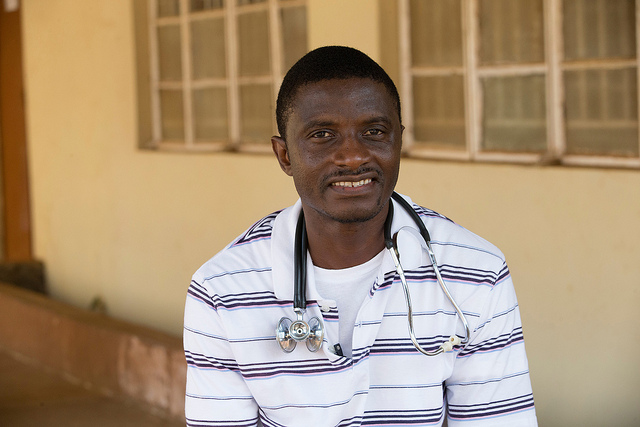Doctor with Ebola Dies in Nebraska Hospital

A doctor who contracted the Ebola virus in Sierra Leone died early today (Nov. 17) while receiving treatment at a hospital in Nebraska.
Dr. Martin Salia was already suffering from "extremely advanced" symptoms of an Ebola infection, including kidney failure and respiratory failure, when he arrived at the Nebraska Medical Center in Omaha on Saturday (Nov. 15), hospital representatives said.
"We used every possible treatment available to give Dr. Salia every possible opportunity for survival," Dr. Phil Smith, medical director of the Biocontainment Unit at Nebraska Medical Center, said in a statement. "As we have learned, early treatment with these patients is essential." [Where Did Ebola Come From?]
Salia was the chief medical officer and surgeon at United Methodist Kissy Hospital in Freetown, Sierra Leone, one of the countries in West Africa that has been hit hardest by the recent Ebola outbreak. Though Salia wasn't working in an Ebola treatment center, there are many people with Ebola in the area where he was treating patients, Smith told reporters today.
Salia was diagnosed with Ebola last week. By the time he arrived in Omaha late Saturday afternoon, Salia was much further into his illness than the two other Ebola patients who were successfully treated at Nebraska Medical Center. Salia was unresponsive, had no kidney function and was working hard to breathe, said Dr. Dan Johnson, head of the critical care division at the University of Nebraska Medical Center, the hospital's academic partner.
Salia had to be put on dialysis within the first few hours of his arrival. Shortly after, he experienced complete respiratory failure and needed multiple treatments to help maintain even marginal blood pressure, Johnson said.
Late Saturday, Salia was given an experimental Ebola treatment known as ZMapp and a plasma transfusion from a patient who survived an Ebola infection. But Salia's condition deteriorated, and he died around 4 a.m. local time today. [How Ebola Got Its Name]
Get the world’s most fascinating discoveries delivered straight to your inbox.
"He progressed to the point of cardiac arrest, and we weren't able to get him through this," Johnson told reporters at a news conference. "We really, really gave it everything we could ... We wish there could have been a different outcome."
The White House extended its condolences to Salia's family and applauded the "heroic" efforts of the Nebraska Medical Center staff.
"Dr. Salia leaves behind loved ones in the United States, his adopted homeland, and in Sierra Leone, where he was born," White House Press Secretary Josh Earnest said in a statement. "Dr. Salia's passing is another reminder of the human toll of this disease and of the continued imperative to tackle this epidemic on the frontlines, where Dr. Salia was engaged in his calling."
The Ebola virus is spread through contact with an infected person's blood, feces or vomit. As a safety precaution, Salia's body will be cremated, hospital representatives said. Autopsies of people who died from Ebola are considered too hazardous for doctors to perform, but samples of Salia's blood will be sent to a secure lab at the Centers for Disease Control and Prevention (CDC) for further analysis.
Smith said the hospital staff who treated Salia would maintain a self-isolation and self-monitoring program. Hospital employees will take their temperature twice a day and check for symptoms once a day, but, Smith added, "as long as they're asymptomatic, they're considered safe."
Salia is the second Ebola patient to have died from the infection in the United States. Thomas Eric Duncan, a Liberian man, died in early October after being diagnosed with Ebola at Texas Health Presbyterian Hospital Dallas.
"We're very grateful for the efforts of the team led by Dr. Smith," Isatu Salia, Martin Salia's wife, said in a statement. "In the short time we spent here, it was apparent how caring and compassionate everyone was. We are so appreciative of the opportunity for my husband to be treated here and believe he was in the best place possible."
Earlier this year, Salia spoke about why he took the job at the hospital, which is in one of the poorest neighborhoods in Freetown.
"I knew it wasn’t going to be rosy, but why did I decide to choose this job?" Salia said in an interview with the United Methodist News Service. "I firmly believe God wanted me to do it. And I knew deep within myself. There was just something inside of me that the people of this part of Freetown needed help."
The current Ebola outbreak is the worst in history. The World Health Organization reported last week that 14,413 people have become sick with Ebola, and 5,177 people have died of the infection since December 2013. The three most affected countries are Guinea, Liberia and Sierra Leone.
Editor's note: This story was updated at 1:20 p.m. ET to add more information about Dr. Salia's case from the news conference.
Follow Megan Gannon on Twitter. Follow us @livescience, Facebook & Google+. Original article on Live Science.



